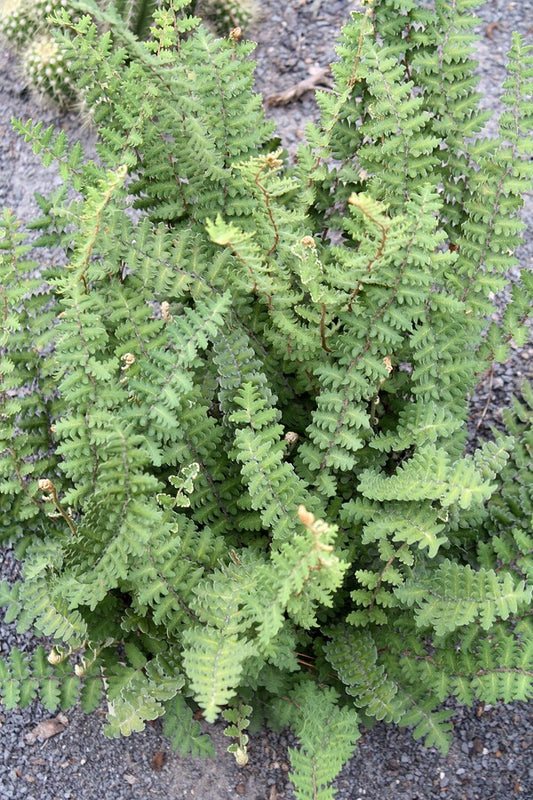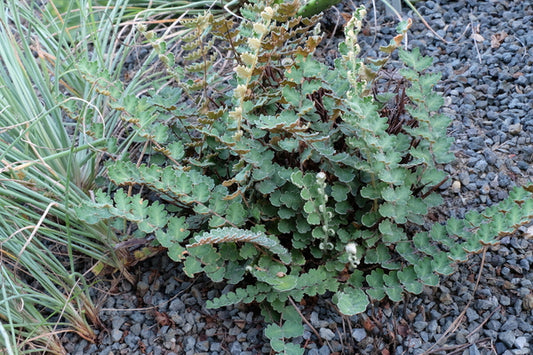Astrolepis is a genus of 8 fern species native to the Americas and the West Indies. The name Astrolepis comes from the Greek "astro" and "lepis" meaning "star-scale". Under a microscope you will see distinctly star-shaped scales on the upper surface of the fronds. Like its close cousins Cheilanthes and Notholaena, Astrolepis is a sun fern that grows on rocks in exposed sites.
-
Astrolepis sinuata
Item #: 3763
Zones: 7a to 9b, at least
Dormancy: Evergreen
Height: 12" tall
Culture: Sun to Part Sun
Origin: United States
Pot Size: 3.5" pot (24 fl. oz/0.7 L)
Regular price $23.00Regular priceUnit price per -
Astrolepis sinuata 'Jeff Davis'
Item #: 5675
Zones: 7b to 9b, at least
Dormancy: Evergreen
Height: 15" tall
Culture: Sun to Part Sun
Origin: United States
Pot Size: 3.5" pot (24 fl. oz/0.7 L)
Regular price $24.00Regular priceUnit price per -
Astrolepis sinuata 'Parker Creek'
Item #: 7066
Zones: 7b to 9b, at least
Dormancy: Evergreen
Height: 12" tall
Culture: Sun to Part Sun
Origin: Mexico, United States
Pot Size: 3.5" pot (24 fl. oz/0.7 L)
Regular price $24.00Regular priceUnit price per
More Information About Astrolepis
Astrolepis is a small genus of 8 species of dryland, sun-loving ferns that is native to the Americas. In the wild, they are usually lithophytic (they grow on rock), so in the garden, sharp drainage is important. You might say that these ferns are the rock stars of the garden. The genus name comes from the ancient Greek ‘astro’ for star and ‘lepis’ for scale. This refers to the star-shaped scales on the upper leaf surface which for the most part is only visible with a hand lens. Many of these Astrolepis were formerly placed in the genera Notholaena and Cheilanthes. As with most dryland ferns, we suggest tucking them up against or even partially under a large rock in the rock or crevice garden. Excellent drainage is essential for these mostly desert-loving ferns.
Astrolepis Growing Conditions
Given its native abode, you'd be right in guessing that Astrolepis is not like most ferns. Astrolepis ferns prefer a dry site to a moist one and cannot tolerate poorly draining winter moist soils. Astrolepis leaves (fronds) are quite toxic, so deer and rabbits do not eat them.
Although Astrolepis fronds like sun and can tolerate heat, the roots prefer to be in shade such as under a rock or in a crack in a boulder, so siting this fern properly is important to its survival. Try tucking the ferns into a stone wall or growing them in a rock garden. Astrolepis will also do well in a container on the patio as long as the soil is well-drained and temperatures remain above the low 20's F.
Types of Astrolepis Ferns
Astrolepis sinuata (Wavy Cloak Fern) (syn: Cheilanthes sinuata) This attractive southwest US native is found on acidic rock outcrops and slopes from Texas south to South America but is rarely seen in cultivation. Surprisingly, in recent years populations have been found around a bridge piling in LA, a natural gas platform in GA and a very large, apparently natural population on granitic cliffs in the Jocassee Gorges of South Carolina. The adaptability of this plant is evident in its range, and it is no surprise that it proves the easiest of the genus to grow in the Southeast. The narrow, upright semi-evergreen thick green fronds with stunning white backs line the black stipe, forming a tight 18" wide upright clump with via short creeping rhizomes. Though not a “beginners” fern, as long as it has good drainage it is fairly resilient. It has even performed well in a fern table where it receives only 4 hours of direct sun in cool and humid Kingston, Washington at Heronswood Garden. In nature, it usually grows with its roots hidden beneath a large rock. (Hardiness Zone 7b-9b)
Astrolepis windhamii (Windham's Cloak Fern): (syn: Notholaena windhamii) This recently described apogamous (able to reproduce without fertilization) species of desert fern is thought to have speciated from a horticultural menage-a-trois of Astrolepis cochisensis, Astrolepis sinuata, and a third party yet-to-be-named. Astrolepis windhamii occurs on both alkaline and acidic soils, up to 5,500' elevation from West Texas west through Arizona. Astrolepis windhamii resembles Astrolepis sinuata except that the pinnae (fern leaves) are more rounded and the leaf lobes shallower. A well drained spot in the rock garden is perfect for this tight clumper, whose rigidly upright brown-backed olive-green fronds reach 1' tall. (Hardiness Zone 7b-9b at least)
Plant Delights Nursery has a huge collection of over 1000 ferns planted in our garden. We also have one of the largest and most esoteric selections of ferns for sale in the US. If you are looking for unusual ferns, Plant Delights should be your first stop. Providing beauty and texture to the garden, ferns are great garden plants and a staple of a well designed garden. When you're ready to buy Astrolepis ferns for your perennial garden, we hope you'll check out our online list of Astrolepis for sale.





